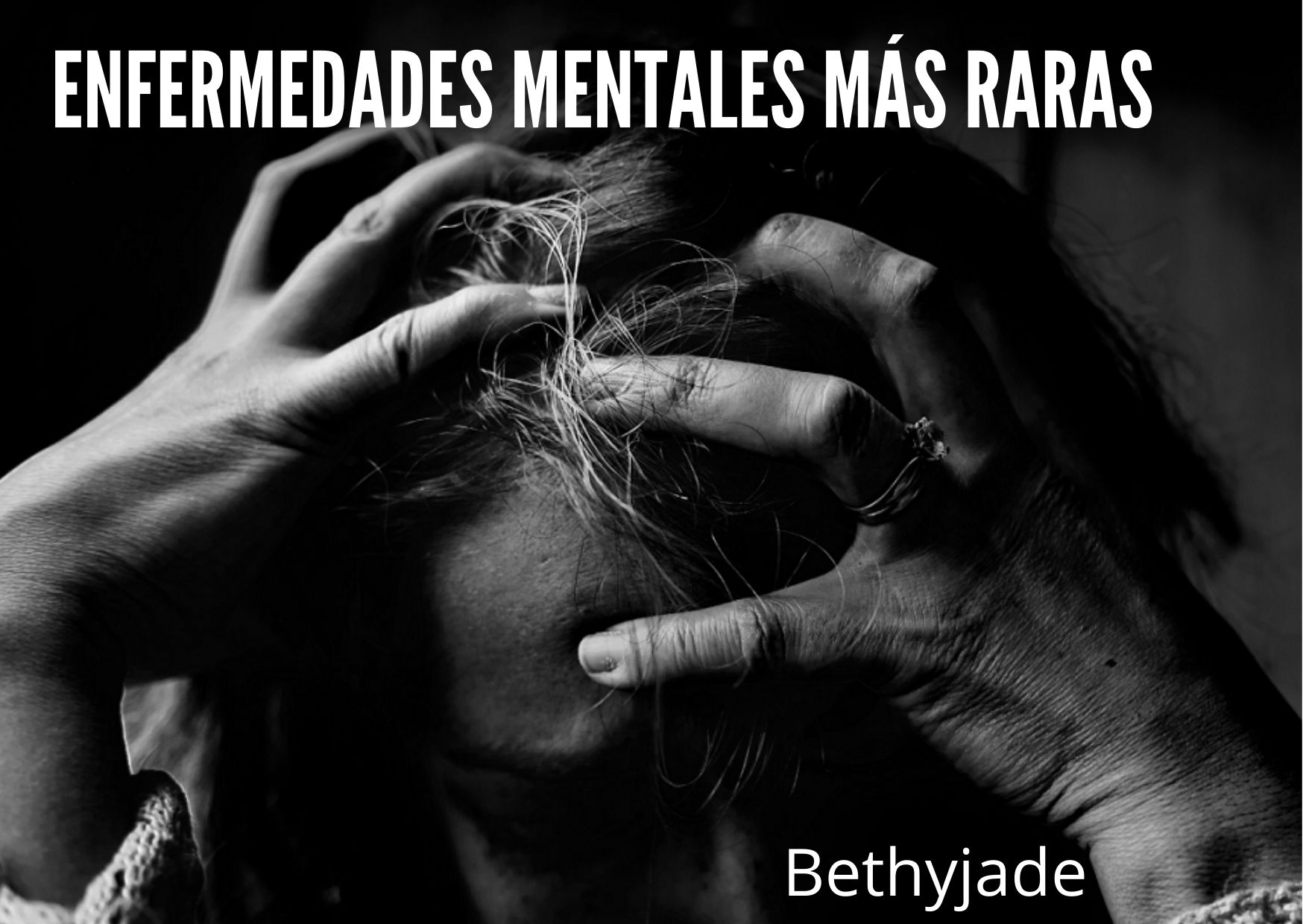
¡Hola, gente de internet! Hoy quiero hablar de algo que aún en muchos países, ya sea por ignorancia o por algún otro motivo, sigue siendo un tema tabú: Las enfermedades mentales.
Hello, internet people! Today I want to talk about something that still in many countries, either by ignorance or some other reason, remains a taboo subject: mental illnesses.
Siempre me ha llamado la atención la psiquiatría, y si no hubiese que estudiar medicina para poder acceder a esa rama, seguro lo habría estudiado jeje, así que compartir este tema con ustedes me resultó interesante. Espero que les guste y les resulte educativo.
I have always been interested in psychiatry and if I didn't have to study medicine to access that branch, I would have studied it for sure hehe, so I found it interesting to share this topic with you. I hope you like it and find it educational.

Sindrome de Capgras / Capgras syndrome

Este síndrome se caracteriza porque el paciente tiene la férrea creencia de que alguno o varios de sus seres allegados han sido sustituidos y son impostores. Usualmente sienten rechazo y miedo a estas personas ya que no tienen el motivo de porqué han sido cambiados ni tampoco saben el paradero de sus «verdaderos» seres queridos.
This syndrome is characterized by the patient's strong belief that one or more of their loved ones have been replaced and are impostors. They usually feel rejection and fear of these people since they have no reason why they have been changed nor do they know the whereabouts of their "real" loved ones.
Esta enfermedad «spico-neurológica» se origina en la incapacidad del paciente de poder reconocer correctamente los rostros, y no solo se ve reflejado en rostros humanos, sino también en los rostros de mascotas por ejemplo. Siendo una enfermedad rara, aún se desconocen muchos datos acerca de ella, como por ejemplo, el origen exacto, sin embargo, las investigaciones siguen en desarrollo.
This "spico-neurological" disease is caused by the patient's inability to recognize faces correctly and is not only reflected in human faces but also in the faces of pets, for example. Being a rare disease, many facts about it are still unknown, such as its exact origin, however, research is still in progress.
Síndrome de Fregoli / Fregoli syndrome

Esta enfermedad deriva de la anterior y consiste en la creencia por parte del paciente de que varias personas son la misma y que pueden cambiarse el rostro para engañarlo. La enfermedad se asocia también a la psicosis y a los delirios paranoicos.
This disease derives from the previous one and consists in the belief of the patient that several persons are the same and that they can change their faces to deceive him/her. The disease is also associated with psychosis and paranoid delusions.
Puede parecer una enfermedad inofensiva (al menos para las personas ajenas) pero la verdad es otra, conforme avanza la enfermedad y asimismo los delirios de persecución, también los pacientes pueden volverse violentos al intentar hacer frente a «sus perseguidores» desde discusiones acaloradas, hasta agredir a otros físicamente.
It may seem a harmless disease (at least to outsiders) but the truth is different, as the disease progresses and so do the delusions of persecution, patients can also become violent in trying to cope with "their persecutors" from heated arguments, to physically assaulting others.
Síndrome de Anton/ Anton syndrome

Esta enfermedad es producto de otra, es decir, ocurre cuando el paciente se ve afectado por una ceguera cortical, que es una lesión cerebral que impide el procesamiento de la visión. Expliquemoslo de una forma sencilla, en un individuo sano, los ojos actúan como el lente de una cámara, filmando todo lo que ve y envía la información al cerebro, que sería nuestro procesador que envía las imágenes a la pantalla dónde podemos reproducirlas al tiempo que nuestro lente las filma. En individuos con ceguera cortical, la parte del cerebro que procesa la visión está dañada o desconectada y es por ello que el paciente no puede ver, pese a que sus ojos están en perfecto estado. Esto suele suceder por accidentes o ataques como los ACV.
This disease is a product of another one, that is, it occurs when the patient is affected by cortical blindness, which is a brain injury that prevents the processing of vision. Let's explain it in a simple way, in a healthy individual, the eyes act as the lens of a camera filming everything it sees and sends the information to the brain which would be our processor that sends the images to the screen where we can reproduce them while our slow filming them. In individuals with cortical blindness, the part of the brain that processes vision is damaged or disconnected and that is why the patient cannot see, even though his eyes are in perfect condition. This usually happens due to accidents or strokes.
Las personas con Anton, tienen la incapacidad de percibir y entender que no ven (sé que suena extraño, pero ellos no fingen que lo hacen) están convencidos de que pueden ver y recurren a imágenes de cuando solían ver para describir ciertos objetos o también pueden recurrir a sus otros sentidos tales como la audición o el tacto, como referencia. Además, pueden hacerse daño a sí mismos sin proponerselo, como por ejemplo tropezar con paredes o resbalar y caer por unas escaleras al intentar bajarlas sin precaución porque ellos «ven perfectamente». Es una manera de protegerse inconscientemente de la discapacidad que ahora poseen y que les aterra, la pérdida de su visión.
People with Anton have the inability to perceive and understand that they don't see (I know it sounds strange, but they don't pretend that they do), they are convinced that they can see and they resort to images of when they used to see to describe certain objects or they may also resort to their other senses as a reference such as hearing or touch. In addition, they may unintentionally hurt themselves, such as by tripping over walls or slipping and falling down stairs when trying to go down stairs without caution because they "see perfectly". It's a way of unconsciously protecting themselves from the disability they now possess and which terrifies them, the loss of their vision.
Zoantropía / zoanthropy

Estos pacientes tienen la ferviente creencia de que se están transformando en algún animal. Su proceso es progresivo y lento, debido a alucinaciones, pueden «ver» como sus extremidades van transformándose hasta completarse la metamorfosis. Pueden progresivamente actuar de forma correspondiente al animal en el que se «transformaron», incluso reaccionar de forma violenta ante ciertas situaciones, sobretodo si el animal se trata de un león, lobo, oso o algún otro depredador. La esquizofrenia puede derivar muchos otras patologías mentales, entre ellas, la zoantropía.
These patients have the fervent belief that they are transforming into an animal. Their process is progressive and slow, due to hallucinations, they can "see" how their limbs are transforming until the metamorphosis is complete. They can progressively act in a way that corresponds to the animal they were "transformed" into, even reacting violently to certain situations, especially if the animal is a lion, wolf, bear or some other predator. Schizophrenia can derive many other mental pathologies, among them, zoanthropy.

Es sorprendente como la salud mental muchas veces es dejada de lado cuando se habla de enfermedades, pero que éstas son un claro ejemplo de que nuestra salud mental es tan importante como la física y que siempre van tomadas de la mano. Bueno, gente, esto ha sido todo por el post de hoy, espero que que les haya gustado y hayan aprendido algo nuevo. Gracias a todos los que apoyan mi trabajo, a los nuevos lectores, mil besos y ya nos encontraremos en otro post.
It's amazing how mental health is often overlooked when talking about diseases, but these are a clear example that our mental health is as important as our physical health and that they always go hand in hand. Well, people, that's all for today's post, I hope you liked it and learned something new. Thanks to all of you who support my work, to the new readers, a thousand kisses and I'll see you in another post.
.jpg)
Thanks for reading.

Las imagenes de portada y despedidas, las hice en el editor Canva y el logo, en la siguiente página:
The cover and farewell images, I made them in Canva editor and the logo, on the next page:
¡Felicidades! Esta publicación obtuvo upvote y fue compartido por @la-colmena, un proyecto de Curación Manual para la comunidad hispana de Hive que cuenta con el respaldo de @curie.
Si te gusta el trabajo que hacemos, te invitamos a darle tu voto a este comentario y a votar como testigo por Curie.
Si quieres saber más sobre nuestro proyecto, acompáñanos en Discord: La Colmena.
¡Muchísimas gracias por el apoyo! Estoy muy feliz
¡Vaya! ¡Qué impresionante! Hay enfermedades verdaderamente terribles de las cuales conocemos muy poco. Cada día debemos estar más agradecidos de nuestras alud mental.
Es así, muchas personas creen que el Cáncer u otras enfermedades de ese tipo son las más terribles (que ojo, no les resto importancia) pero siento que las enfermedades mentales (al menos las más graves) son mucho peor ya que no solo se radican en la mente sino que paulatinamente también van enfermando el cuerpo.
Muy buen post, soy Psicólogo desde hace 15 años y no he coincidido con casos de esta índole hasta ahora, son muy raros justamente porque las probabilidades de conseguir a alguien que los padezca son escasas. Casos un poco raros que si se ven y son más factibles de encontrárselos tienen que ver con la Psicología/Psiquiatría transcultural, si te interesa esa información, en google encontrarás datos al respecto, un saludo 👍🙂
¡Muchas gracias por leer, comentar y por la información! De cierto modo se podría decir que es mejor que sean enfermedades poco comunes debido al sufrimiento que conlleva padecerlas y es bueno que no sea un problema común. Los padecimientos mentales (en mi humilde opinión) creo que son incluso más problemáticos y dolorosos que muchas enfermedades físicas.
Congratulations @bethyjade! You have completed the following achievement on the Hive blockchain and have been rewarded with new badge(s) :
Your next target is to reach 700 upvotes.
Your next target is to reach 20000 upvotes.
You can view your badges on your board and compare yourself to others in the Ranking
If you no longer want to receive notifications, reply to this comment with the word
STOPTo support your work, I also upvoted your post!